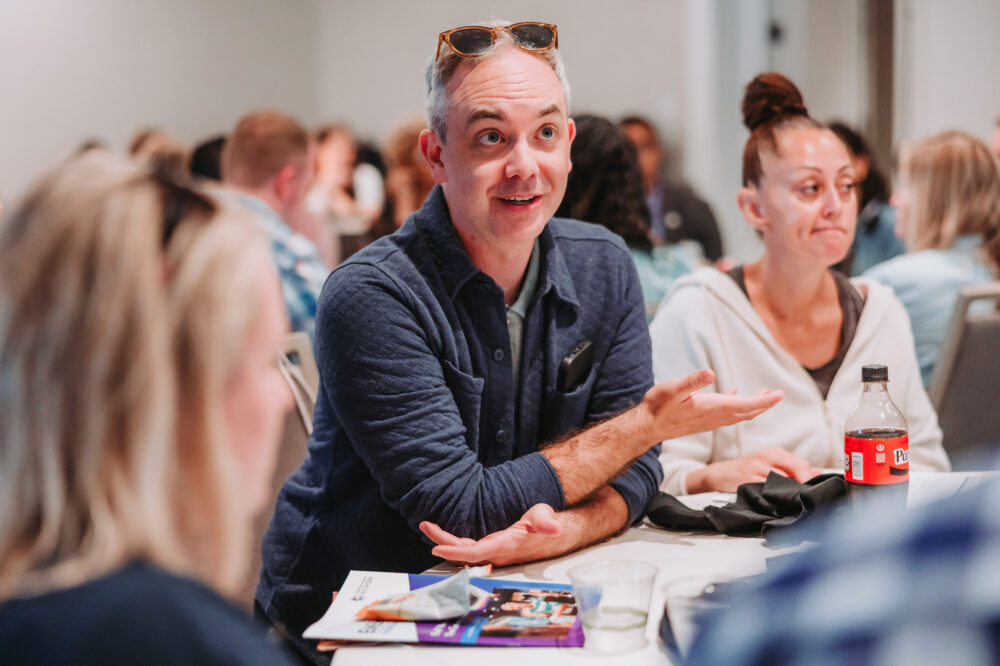Uncertainty, Trust, Resilience, Freedom: 4 Words for the Present and Future of Financial Health
Following his first EMERGE experience, Taylor C. Nelms – Vice President of Research & Insights at the Financial Health Network – reflects on the stories and themes that stood out most.
-
Program:
-
Category:
-
Tags:

Attending EMERGE Financial Health for the first time made it clear why the Financial Health Network is the Financial Health Network.
After joining the Financial Health Network in March as the organization’s new Vice President of Research & Insights, attending EMERGE served as an introduction to our vibrant financial health community. I was struck by how much of the learning at EMERGE happened collectively – not sitting in a conference room, but connecting with fellow attendees between sessions; not simply listening to a keynote, but digesting it afterward in the lounge.
As it does year after year, the conference became the channel through which many of financial health’s most important developments surfaced and came together in new, clarifying ways.
At EMERGE 2025, we heard real people share the stories of their financial lives. It was easy to feel distracted by everything happening in the world on the way to San Diego. But at the conference, we were charged to tune in, listen well to the voices of our neighbors and colleagues, and learn together from their experiences. From these conversations, I heard four words rise above the noise that, I believe, reflect this moment in financial health and can perhaps orient its future: uncertainty, trust, resilience, and freedom.
1. Uncertainty
At EMERGE (and perhaps in other professional spaces you frequent), uncertainty was on the tips of everyone’s tongues.
“In a moment of profound uncertainty …”
“Facing deep uncertainty about the future …”
“These are uncertain times …”
This isn’t the first time we’ve heard musings like these. But at EMERGE, I think the collective expression of uncertainty was an effort to gather the noise, whiplash, and disorientation many feel and package them into something more palatable for the conference room stage or lunch table. It’s a way to acknowledge the unpredictable political and economic context in which we all live and work – but I’m not sure it helps us deal with that context.
For over two decades, the Financial Health Network has led the charge to navigate uncertainty by identifying, understanding, and addressing the real financial challenges and opportunities facing people in the United States. As people’s financial realities have changed, that has required the organization to change, too: from a focus on banking access to a focus on financial health outcomes for consumers and workers, from measuring Americans’ financial health as a whole to digging deeper into the unique needs of communities, and from defining challenges to identifying practices that can drive widespread progress toward true financial health for all.
In the face of uncertainty – when the trustworthiness of information and access to good data are not necessarily guaranteed – research and actionable insights matter even more. I think the next three words I heard at EMERGE – trust, resilience, and freedom – can become organizing principles for the future of financial health precisely because this “moment of uncertainty” demands them.
2. Trust
Trust is the invisible currency that underpins every financial relationship. The anthropologist Carlos Vélez-Ibáñez once described the most basic of financial operations – small-scale, community-based saving and lending – as dependent on trust, writing that such operations require that we “trust in the trustworthiness of others.” That basic principle scales up, no matter the size of the institution or complexity of the product.
Many have argued that we are facing a growing “trust crisis” across the private and public sectors. Gallup and Edelman, among others, have documented widespread declining trust in institutions. For marginalized communities in particular, a significant barrier to engagement is a lack of trust in the mainstream financial system. The FDIC has consistently found that a lack of trust is a key driver of being unbanked and underbanked, and our own data at Financial Health Network shows that nearly a third (30%) of Financially Vulnerable Black Americans distrust financial institutions, considerably higher than Financially Healthy (19%) and Coping (19%) Black Americans.
At EMERGE, these sentiments could be heard on the mainstage in the conversation with Charles and Tiffany White and in the experience of Chime member Andre Brown, and they were echoed in discussions with industry leaders about transparency, ethics, and customer-centric design.
Rebuilding trust calls for financial institutions to truly understand communities’ lived experiences and embed that understanding in how they run their business. This is why the Financial Health Network is leading the charge in aligning around new FinHealth Industry Standards that put consumer financial health first. As Financial Health Network CEO Jennifer Tescher wrote recently in American Banker, in an era of deregulation, “The smart choice is to hold fast to the norms that foster trust in the system.”
Trust is not just a moral imperative; it’s also a strategic one.
3. Resilience
If trust is the foundation of financial health, resilience strengthens that foundation, buffering it from change and challenge. This theme reverberated at EMERGE 2025 because the past few years have tested people’s financial resilience like never before. A global pandemic, a surge in inflation, and increasingly frequent natural disasters have shown how quickly livelihoods can be upended.
We know the numbers: A majority of U.S. households are not Financially Healthy, and after a brief improvement in 2021, Americans’ overall financial health has slipped back to pre-pandemic levels. In practical terms, this means millions of people lack a cushion for emergencies, whether that cushion comes in the form of financial slack, emergency savings, workplace benefits, or adequate insurance. Resilience is front and center, because any shock – a job loss, a medical bill, a flood – can spiral a family into financial ruin.
On the EMERGE stage, we heard about the long road to financial recovery after natural disasters. We also heard how employers and policymakers can bolster resilience by offering better safety nets, from emergency savings programs to insurance products and disaster relief funds.
Building resilience means creating the conditions in which a setback doesn’t become a permanent defeat.
Shocks are inevitable; the future of financial health will be measured by how well we prepare communities to prepare for, absorb, and rebound from those shocks. It requires foresight to address actual and potential financial vulnerability – for example, helping people save, get insured, and adapt to changing circumstances during good times.
This means we must continue to invest in measurement to stay alert and agile amid change. It also requires responsive support, policies, and practices that provide relief in bad times. Resilience is not so much a personality trait as an outcome of collective action, both in preparation and in response. When neighborhoods, communities, institutions, and economies are resilient, individuals have a far better chance of recovering and even emerging stronger.
4. Freedom
Finally, I was struck by how powerfully freedom came through at EMERGE 2025 as a true north for people’s financial aspirations, especially in the stories of those on the mainstage. It rang out over and over again in very concrete ways.
What do people mean when they talk about freedom in the context of money? Their financial freedom was about achieving the kind of security that empowers you to live unshackled by financial stress. Freedom from want, freedom from fear, freedom to take the opportunities in front of you.
“Necessitous men are not free men,” FDR famously wrote – and we all know this to be true. When a student forgoes education because of cost, when an entrepreneur’s potential is stifled by lack of capital, when a working parent feels stuck in a job for the health benefits, their choices are constrained by their circumstances. Fewer than half of Americans today feel confident they’re on track to achieve their financial goals – and a person without the confidence to dream is not truly free.
Improving financial health can unlock that freedom: to change jobs, start a business, relocate, retire with dignity, or simply sleep better knowing the bills are paid. Freedom is the endgame – not in the sense of unattainable wealth for all, but in ensuring people have enough stability and agency to chart their own course.
Financial freedom has big-picture social implications. It implies a world in which one’s future isn’t predetermined by one’s family or zip code. And ultimately, this is the question that felt overlooked amid all the talk about uncertainty. What’s at stake in these uncertain times is this: a financial system that offers everyone a fair shot. In a way, financial freedom is the promise that makes all our other ideals, all the other parts of what we so often think of as a good life – family, shelter, education, leisure – attainable.
Following These Signposts to a Financially Healthier Future
What can we learn about the present and future of financial health by reflecting on the lessons shared at EMERGE? Coming out of my first EMERGE, these principles feel like signposts for building a future where financial health is within reach for all.
To financial services leaders: These themes are a reminder that how we do business is as important as what we do. Earning the trust of customers, investing in their resilience, and expanding their freedom will ultimately define our success.
To researchers and policymakers: The message is that metrics like bank account access or credit scores only tell part of the story; we must also measure trust in communities, resilience to shocks, and freedom to prosper, and design interventions that move the needle on all three.
For all of us: These themes outline a narrative that insists we can rebuild trust in our institutions piece by piece, we can strengthen the financial resilience of families and communities, and we can break the cycle of insecurity so that freedom is more than just an ideal. The very fact that trust, resilience, and freedom have emerged as rallying cries suggests a collective readiness to grapple with the challenges. These words carry weight because they speak to basic human aspirations: to believe in one another, to withstand adversity, and to transcend mere survival.
In the coming months, I expect I will continue circling back to these themes. If you’re also reflecting on how to integrate the voices and lessons of EMERGE into your financial health work, the Financial Health Network is here to help. In uncertain times, it’s not enough to name the challenges – we must commit to building a future grounded in trust, resilience, and freedom. Let’s get to work.
